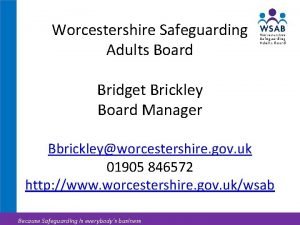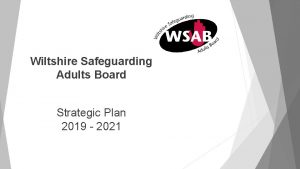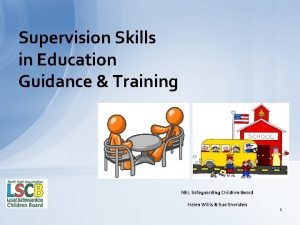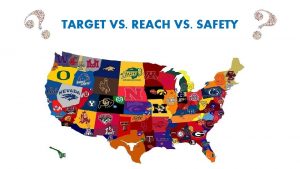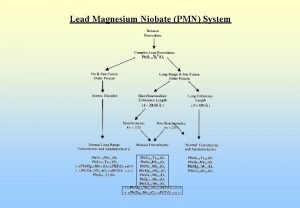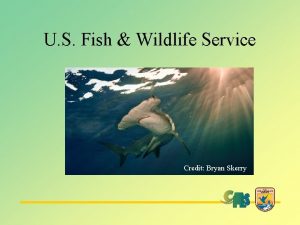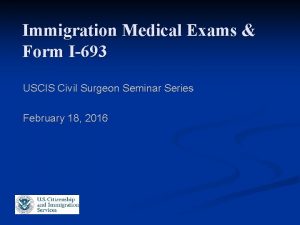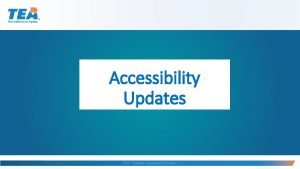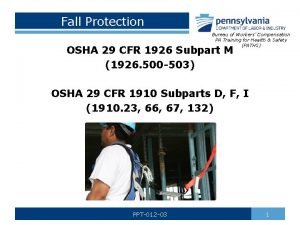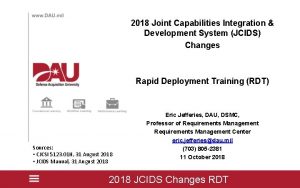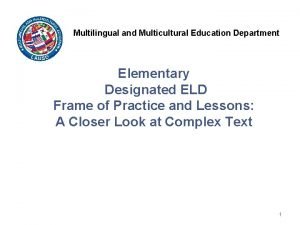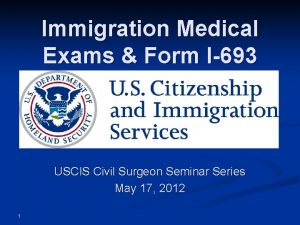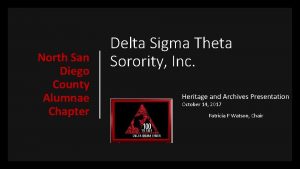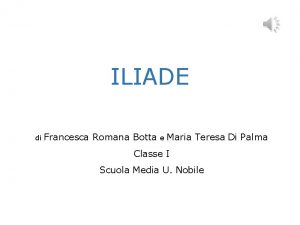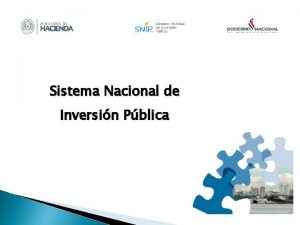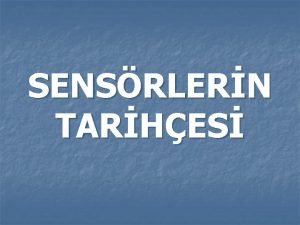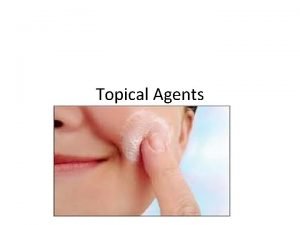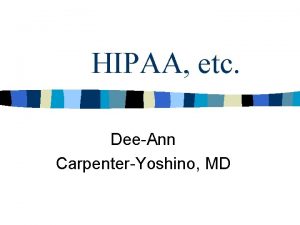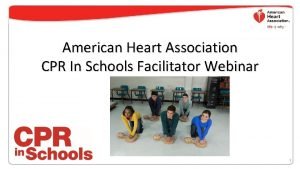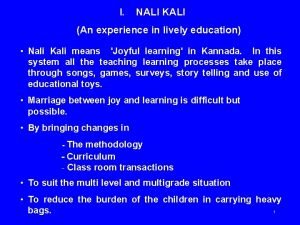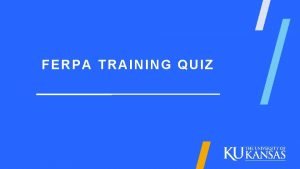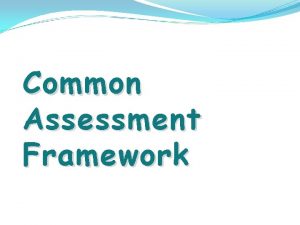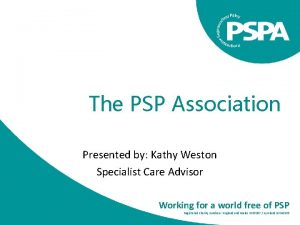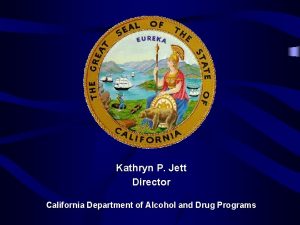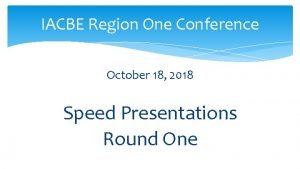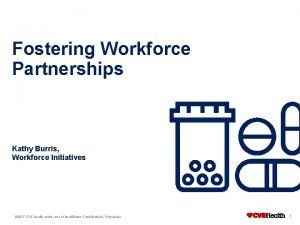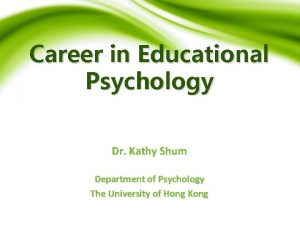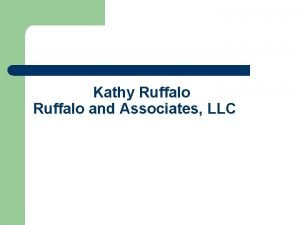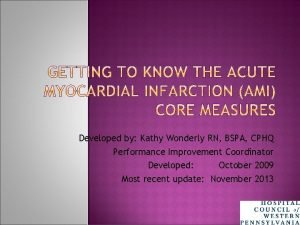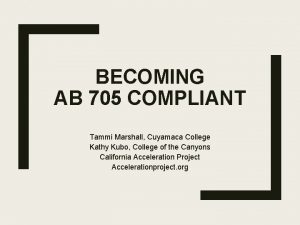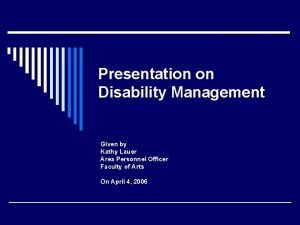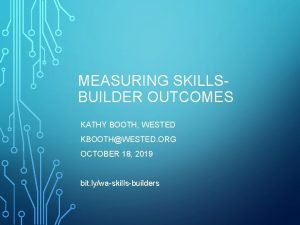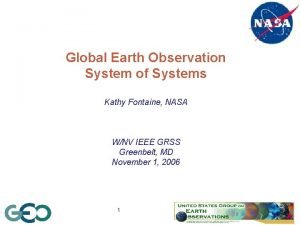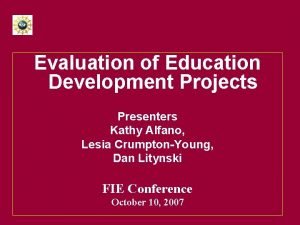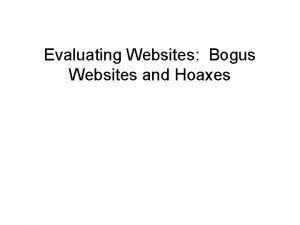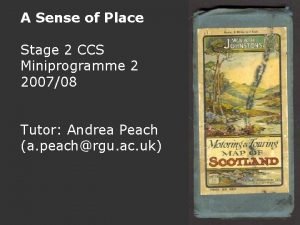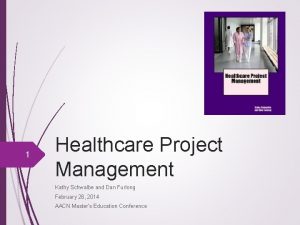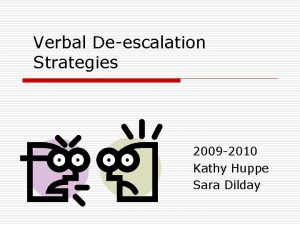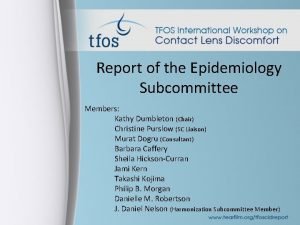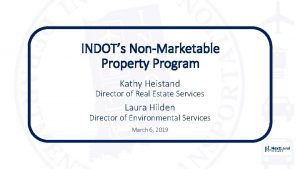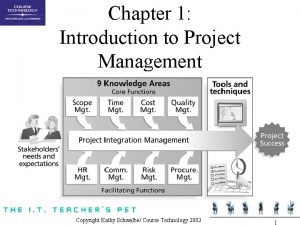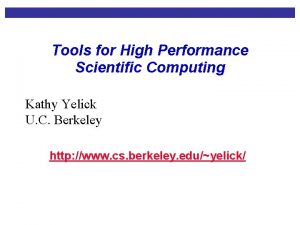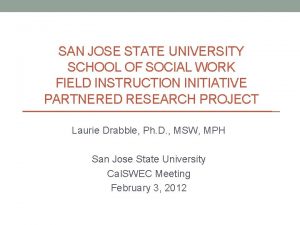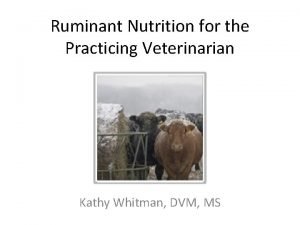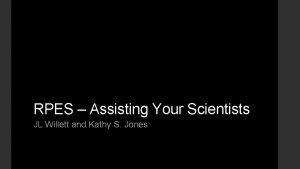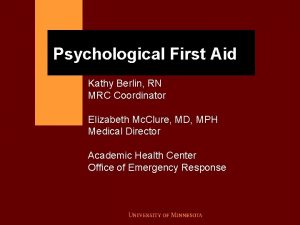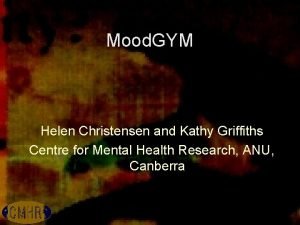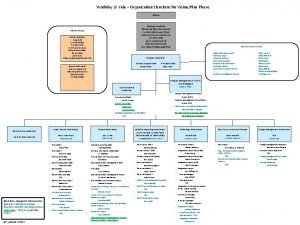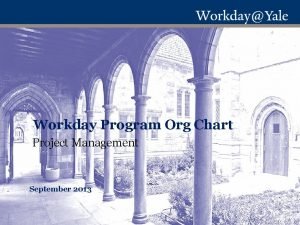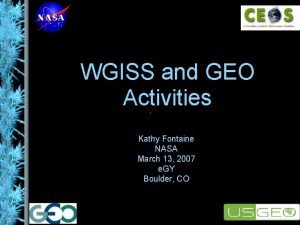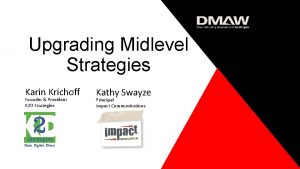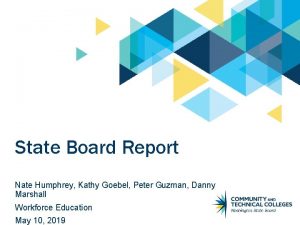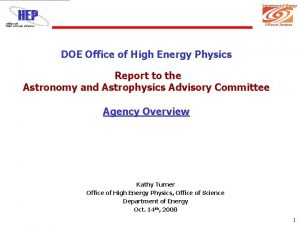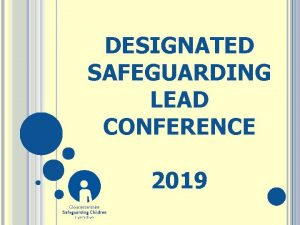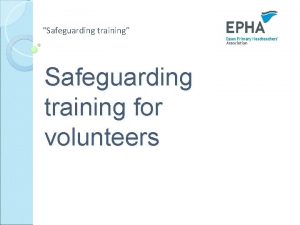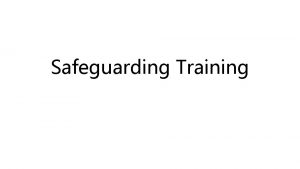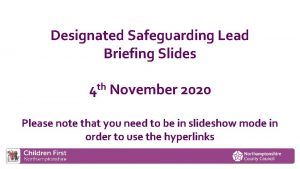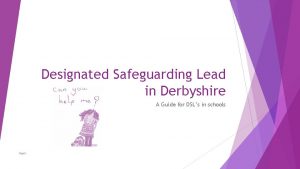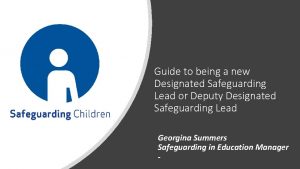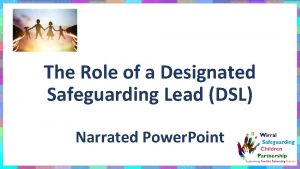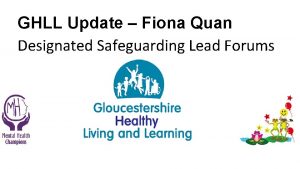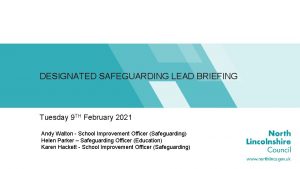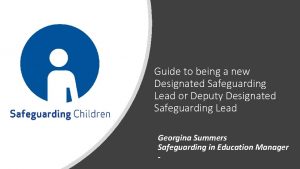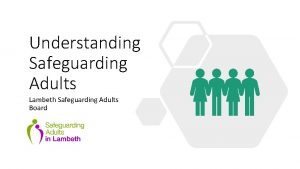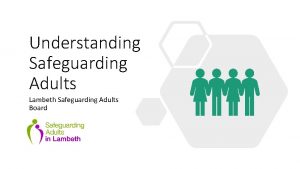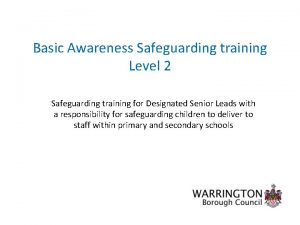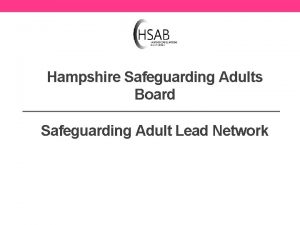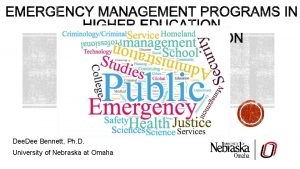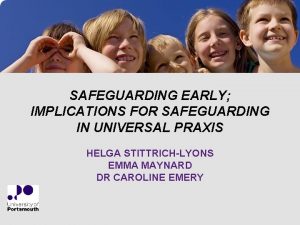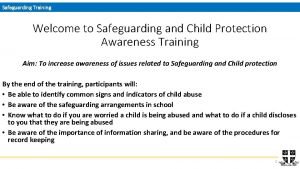Designated Safeguarding Lead Training Schools Kathy Dee Early








































































































- Slides: 104

Designated Safeguarding Lead Training - Schools Kathy Dee Early Help Partnership Coordinator

Learning Outcomes • A greater understanding of the responsibilities attached to your lead role. • Gain confidence in revising policies and procedures and embedding them across the school. • Understand the importance of management oversight of staff working with families. • Recognise the role of your setting in providing early help to vulnerable children in order to minimise and manage risk. • Managing concerns and the process for referring those children who may be in need of protection or intervention from other services. • Understand embed the learning from Serious Case Reviews to improve school practice.

Content for the day. . Morning Defining the role Getting down to the business of Early Help and Safeguarding: ØPolicies, procedures in practice ØMinimising risk ØEarly Help Framework Lunch Afternoon Managing risk Accountability Compliance Safer Recruitment LADO process

Assumptions • You all have some experience of Safeguarding in Schools. • You are either new to the role of Designated Senior Lead for Safeguarding in your school, or are refreshing your training, or you deputise in the role. • You all are familiar with the signs and indicators of harm. • You all understand that Child Protection is a process that is followed in those cases where an individual child is believed to need statutory intervention.

Defining your role Who do you think you are? Write a sentence that describes your role as safeguarding lead?

Some context • Children spend half their waking hours in school and for some it is the only safe place in their daily lives. • School staff are in a position to identify concerns early and provide help to children to prevent things escalating. • They may be the first people that children tell about their experiences of abuse. • School staff need to work with colleagues in other agencies to promote the welfare of children and protect them from harm 6

Keeping Children Safe in Education (September 2016) Clarifies governing bodies, proprietors and management committees should appoint an appropriate senior member of staff, from the school or college leadership team, to the role of Designated Safeguarding Lead. • The Designated Safeguarding Lead should take lead responsibility for safeguarding and child protection. • This should be explicit in the role-holder’s job description. • This person should have the appropriate status and authority within the school to carry out the duties of the post. • They should be given the time, funding, training, resources and support to provide advice and support to other staff on child welfare and child protection matters, to take part in strategy discussions and inter-agency meetings – and/or to support other staff to do so – and to contribute to the assessment of children. • a new requirement that staff are regularly updated on safeguarding and child protection as required, but at least annually

Relationships – Worksheet 1 Daily/Weekly/ Termly/Annually Safeguarding Daily/Weekly / Termly/Annually Lead At. . . . . Daily/Weekly/ Termly/Annually

Role and responsibility - Worksheet 2 Write in the boxes your view on the following statements as a safeguarding lead in your organisation: Expectations of yourself in your lead role: Performance or reality of your lead role Expectation of others of your lead role:

Signs of Role Confusion • • Concern over decision making Unbalanced workloads Ineffective communication leading to lack of action Questions about who does what Not sure, so take no action, attitude Creation of and attention to non-essential work Long journey needed to find an answer to a question

Understanding the Legislation and statutory guidance that underpins

Legislation and Guidance Education Act 2002 Section 175 (maintained schools) and Section 157 (academies and Independent schools) • A governing body shall make arrangements for ensuring that the functions relating to the conduct of the school are exercised with a view to safeguarding and promoting the welfare of children who are pupils at the school.

Legislation and guidance Legislation for safeguarding children are: Ofsted • The Children Act 1989 and 2004 Inspection • The Human Rights Act 1998 Framework • The Adoption and Children Act 2002 • The Education Act 2002 • Counter-Terrorism & Security Act 2015 - Prevent Duty Guidance • Duty to report FGM 2015 Key statutory guidance: • Munro Review of Child Protection (2011) • EYFS Statutory Framework (2017) • Working Together to Safeguard Children (2015) • What to do if your worried a child is being abused (2015) • Keeping Children Safe in Education (2016)

Early Help, Safeguarding and Child Protection is Everyone’s responsibility

Keeping Children Safe in Education q Everyone must read Part One and Annex A q Everyone would find Annex C (Online safety) in the full guidance

What do you know already? Is your safeguarding and child protection policy updated? Is it clear who staff should report any concerns to? Are you , or your staff clear about the format to record and report concerns? Are you or other staff aware how to report any concerns about staff? Who else might need to know if you have concerns about a child?

Governance • Inspecting governance of a school during a section 5 inspection is an important aspect of the judgement about the effectiveness of leadership and management. • In maintained schools, the accountable body is the governing body, whereas in academies it is the board of trustees. This means that both in stand-alone academies and in a multi-academy trusts (MATs) the accountable body is the board of trustees. A letter is sent to the governing body of a maintained school and board of trustees of a standalone academy or MAT, notifying them of the inspection. • However, MATs operate through many different structures and sizes, and while all are now expected to have identified a senior executive leader (SEL) some may not have an identified Chief Executive Officer (CEO) role so they are not automatically notified when a school within their MAT is being inspected.

Message from Ofsted’s Chief Inspector Headteachers had told her that "it sometimes felt as if inspection was a box-ticking exercise when it came to safeguarding". "We want school leaders to use their experienced judgement, rather than to feel the need to invent and then conform to prescriptive policies. Inspectors have now been trained to focus more on what schools are doing to identify children potentially at risk of real harm; how these children are being helped; and how they manage accusations and other serious problems with staff". Amanda Spielman – Ofsted Chief Inspector (2017) You can read the full speech here: https: //www. gov. uk/government/speeches/amanda-spielmans-speech-at-the-birmingham-schoolpartnership-conference

Governance 11/1/2020 Slide 19

Legislation and Guidance What do we mean when we say Safeguarding and Child Protection? 11/1/2020 Slide 20

Safeguarding and Child Protection are not the same thing

Safeguarding describes how we keep all children safe. Child Protection describes what we do for children affected or who are likely to be at risk of significant harm

Safeguarding and Child Protection Safeguarding and Promoting the Welfare of children is defined as: • protecting children from maltreatment; • preventing impairment of children's health or development; • ensuring that children are growing up in circumstances consistent with the provision of safe and effective care; and • taking action to enable all children to have the best life chances. Working Together to Safeguard Children (2015) Child Protection is defined as: • Child protection is part of safeguarding and promoting the welfare of children • It is activity undertaken to protect specific children who are suffering or at risk of suffering significant harm Working Together to Safeguard Children (2015) 11/1/2020 Slide 23

Early help and safeguarding Leadership and management Behaviour and safety What would good early help and safeguarding look like in these areas in your setting? Dealing with allegations. Selection and recruitment 11/1/2020 Slide 24

Safeguarding in practice Minimising Risk Single Central Record Safe premises Signing in protocols Whistleblowing Premises Safety & risk assessment Off sight visits & risk assessment Curriculum & Safety Health & Safety Media & Online safety Agency, students & Volunteers Formal & Informal teaching Child’s Voice at the Centre Selection & Recruitment Staff Induction Supervision & Performance monitoring Relationships & Behaviour Safeguarding Policy and Procedures Allegations against staff Day to day routines Child Sexual Exploitation Female Genital Mutilation Gang Affiliation Radicalisation & Extremism Attendance Bullying Exclusions Peer on Peer abuse

Whole school approach • Devise • Embed • Review • Up-date Policy How does your school? Strategy Practice

Whole school approach in practice Staff and volunteers Governors, schools, multiagency partners, community Parents and carers

Understanding Early Help & Safeguarding

What is Early Help? Early help means… providing support as soon as a problem emerges, at any point in a child’s life. Early Help is not just early in age, it’s early in any problem at any time 11/1/2020 “Agencies refer too many children to LA whose problems are at early stage…. too many children and families are subject to a statutory assessment…delays them getting the right help. . “Providing early help is more effective in promoting the welfare of children than reacting later. ” Slide 29 Working Together to Safeguard Children, 2015 Children’s Services Ofsted Inspection (June 2014)

Early Help – The Key Principles Building resilience Based on a strong universal offer in schools, children’s centres and health 11/1/2020 Shared responsibility for identifying vulnerable children, young people and families Slide 30 The right support, from the right agency, at the right time Establishing quality relationships Developing skills and capabilities Connecting families to the wider community

November 20 Slide 31

Early Help – Whole school approach 1. Understand What children might be considered Early Help, emerging needs in your school? 2. Plan What systems do you have in your school already to identify children with emerging needs? 3. Do In your school what action plans/goal setting do you currently have for these children? 4. Review What systems do you have in place to monitor your actions plans currently?

Relationship-based Practice 1. Understand • Building relationship and holistic understanding of the child: One family, One plan = One story 2. Plan • Plan for change through pathways to help and support 3. Do • Empower and enable family to make positive changes 4. Review • Review and family feedback on what difference it’s made The four ‘R’ Practitioner Understand Plan Do Reflective Responsive Resourceful Review Resilient

Early Help - Recording Discuss – “If it isn’t written down it didn’t happen” • Various methods of recording within schools • Strengths and weaknesses • The importance of recording – allowing you to • Understand • Plan • Do • Review Early Help • Report Writing • Accountability Child Protection • Evidence

Evidencing early help in practice Are all worries and concerns recorded and monitored in a consistent way and do they inform the targeting of early help? Good practice • • • A ‘zero threshold’ is in place for the level of worries and concerns that get recorded and discussed: no concern is too small to be considered All staff have access to the recording system used in the school Records are monitored and collated regularly by the SLT to review plans and progress

Early Help Record 11/1/2020 Slide 36

Early Help and Pathways to Community • The term ‘step down’ also know as ‘de-escalating refers to the process we follow when responsibility for supporting a child or young person transition from one agency to another when the needs of a family have changed. • Transition (step-down) occurs at the end of an assessment which concludes that ongoing statutory involvement is no longer required and needs are at Level 2 and would benefit from an Early Help Plan to sustain positive outcomes.

Advice and support available through the Early Help Partnership Team West Neighbourhood Vicki Kitts East Neighbourhood Central Neighbourhood South Neighbourhood Early Help Partnership Coordinator Rehema Essop Dawn Henry Early Help Partnership Coordinator e: Vicki. Kitts@newham. gov. uk T: t: 020 3373 4106 e: Kathy. Dee@newham. gov. uk t: 020 3373 0673 e: Rehema. Essop@newham. gov. uk t: 020 3373 4672 e: : Rehema. Essop@newham. gov. uk t: 020 3373 7031 Kathy Dee West Neighbourhood Samantha Clarke Early Help Partnership Practitioner e: samantha. clake@newham. gov. uk T: 020 3373 2410 East Neighbourhood Amber Robinson Central Neighbourhood Musarat Rashid South Neighbourhood Marsha Longe Early Help Partnership Practitioner e: Amber. Robinson@newham. gov. uk e: Dawn. Henry@newham. gov. uk t: 020 3373 1037 e: Jasmin. Choudhury@newham. gov. uk t: 020 3373 1225 Remi Desouza Early Help Partnership Programme Officer e: Remi. Desouza@newham. gov. uk t: 020 3373 2934 Jannah Akter Project Manager Integrated Neighbourhood Working e: jannah. akter@newham. gov. uk t: 020 3373 7746 t: 020 3373 4651

A Developing Model -Team Around the Relationship Co nsi on si rvi pe Su ste ncy Integrated Neighbourhood Co ach sup ing a por nd t Team around the School Team Around the Family p el k H or y he rl ew t a E am nd Fr u ro ly A mi a am F e T Family and community supporting child or young person One family, One Plan = One Story d an t g n n rni pme a Le velo De

NAMs’ where and when… West NAM East NAM Date: Weds (11/10 - fortnightly) Date: Weds (11/10 – fortnightly) Time: 13: 30 – 15: 30 Time: 10: 00 – 12: 00 Venue: St Stephen’s Children’s Venue: Maryland Children’s Centre Central NAM Date: Thurs (12/ 10 - fortnightly) Time: 10: 00 – 12: 00 Venue: Oliver Thomas Children’s Centre South NAM Date: Thurs (12/10 - fortnightly) Time: 13: 00 – 15: 00 Venue: Winsor Primary

Integrated Neighbourhoods East: Manor Park & Green St West: Stratford, West Ham & Forest Gate Central: East Ham & Plaistow South: Canning Town, Custom House, Beckton & Royal Docks

Break 11/1/2020 Slide 42

Welcome Back • Re-Cap on morning session • Any outstanding questions • Afternoon session – Managing Risk – Accountability – Compliance – Learning Lessons ?

Quiz 11/1/2020 Slide 44

Managing concerns and professional judgement Who makes the final decision? And with what training? Who are staff working with families accountable to? Based on what information? Who is the lead in safeguarding accountable to? How do you evidence accountability?

Managing Risk Values and Beliefs

Compliance Legislation for safeguarding children are: • Section 175 and 157 of the Education Act • Keeping Children Safe in Education (Statutory Guidance for Schools revised in April 2014 , May 2015 and again in Sept 2016) • Working Together to Safeguard Children (up-dated March 2015) • Counter-Terrorism & Security Act 2015 - Prevent Duty Guidance • Duty to report FGM 2015 Ofsted • Inspections (can be triggered by a Safeguarding complaint from parents) • Inspectors will always make a written judgement under leadership and management about whether or not the arrangements for safeguarding children and learners are effective.

What does compliance look like? • Senior leaders and governors take Statutory Guidance (and all its revisions) into account when implementing policies, procedures and practice and are alert to local issues and priorities. • Ofsted Inspectors are content with evidence provided. Complete Compliance questionnaire - feedback

Children Missing Education (CME) • All schools (including academies and independent schools) much notify their local authority when they are about to remove a pupil’s name from the school admission register. • All schools must notify the LA within five days of adding a pupil’s name to the admission register at a non-standard transition point 49

Child Sexual Exploitation • Sexual exploitation is a form of sexual abuse, in which a young person is manipulated or forced into taking part in a sexual act. This could be as part of a seemingly consensual relationship, or in return for attention, affection, money, drugs, alcohol or somewhere to stay. • The young person may think that their abuser is their friend, or even their boyfriend or girlfriend. But they will put them into dangerous situations, forcing the young person to do things they don’t want to do. The abuser may physically or verbally threaten the young person, or be violent towards them. They will control and manipulate them, and try to isolate them from friends and family. 50

Indicators of concern • Associating with other young people involved in exploitation; • Having older boyfriends or girlfriends; • Suffering from sexually transmitted infections; • Mood swings or changes in emotional wellbeing; • Drug and alcohol misuse; • Displaying inappropriate sexualised behaviour. • Going missing for periods of time or regularly coming home late; • Regularly missing school or not taking part in education; • Appearing with unexplained gifts or new possessions (often new mobile phones) 51

Increased Vulnerabilities • • • Looked-after children/being in care Excluded from mainstream school Those experimenting with drugs and alcohol History of childhood abuse Those with parents who misuse drugs and alcohol Those who have experienced or watched domestic violence. 52 52

Peer on Peer Abuse • • • Bullying (including cyber bullying) Gender based violence Teenage relationship abuse Sexually inappropriate behaviour Sexting • Resource: Traffic Light Tool: https: //www. brook. org. uk/ourwork/category/sexual-behaviours-traffic-light-tool 53

How safe are our children? (NSPCC, 2017)

How safe are our children? (NSPCC, 2017)

Online Safety • Thinkuknow - offline safety programme for children, young people, schools and parents • UKCCIS - Sexting in schools and colleges • Indecent images of children: guidance for young people: Indecent images of children: guidance for young people - GOV. UK 56

Online Safety q Df. E have merged 'Supporting children and young people who are bullied: advice for schools' with 'Preventing and tackling bullying'. q Df. E have also issued guidance for school leaders on cyberbullying and an advice leaflet for parents 57

www. barclayslifeskills. com/i-want-to-use-my-online-presence-to -get-ahead/left-education/your-digital-footprint/

Female Genital Mutilation ‘the partial or total removal of the female genitalia… for cultural or other non therapeutic reasons’. World Health Organisation • Illegal operation in the UK for almost 20 years. • Female Mutilation Act 2003. • Replaced Prohibition of Female Circumcision Act 1985. • Offence to acts performed outside the UK. • Fine, imprisonment up to 14 years or both. • Form of child abuse and is illegal. • Child Protection referral to Social Services. • Referral to Police. • FGM places a child at significant harm. • Section 47 of Children Act 1989. • Case Strategy Meeting. 59

Mandatory Reporting on known Cases of FGM (October 2015) • From 31 st October 2015, all regulated professionals (health, teachers, social workers) are required to report all known cases of FGM in girls under 18 s which they identify in the course of their professional work direct to the police. • The duty applies to any teacher who is employed or engaged to carry out ‘teaching work’, whether or not they have qualified teacher status, in maintained schools, academies, free schools, independent schools, nonmaintained special schools, sixth form colleges, 16 -19 academies. • This is a personal duty; it cannot be transferred to anyone else. • Failure to report is not a criminal offence but may lead to local disciplinary proceedings. 60

‘Known’ Cases ‘Known’ cases are defined as those where a teacher: • is informed by a girl under 18 that an act of FGM has been carried out on her; or • observes physical signs which appear to show that an act of FGM has been carried out on a girl under 18 and they have no reason to believe that the act was necessary for the girl’s physical or mental health or for purposes connected with labour or birth. The duty does not apply in suspected cases or if a teacher identifies a child at risk of FGM but these concerns should be reported to the Designated Safeguarding Lead within the school in any event. 61

FGM support and guidance Manor Gardens – health and community services • Advice and guidance • Training and workshops • Contact details: e: alima. dimonekene@newham. gov. uk e: rita. buhanda@newham. gov. uk t: 020 7272 4231 FGM resource pack – resource pack with lots of resources – leaflets to use in different languages. https: //www. gov. uk/government/publications/female-genital-mutilation -resource-pack/female-genital-mutilation-resource-pack 62

Prevention of Extremism and Radicalisation What is Prevent? • Prevent is the Government’s strategy to stop people becoming terrorists or supporting terrorism, in all its forms. Prevent works at the pre-criminal stage by using early intervention to encourage individuals and communities to challenge extremist and terrorist ideology and behaviour. • The Counter-Terrorism and Security Act 2015 places a duty on schools and FE Colleges to have “due regard to the need to prevent people from being drawn into terrorism”. • The Prevent duty reinforces existing duties placed upon educational establishments for keeping children safe. • Ofsted will inspect schools’ compliance with this duty. 63

What does this mean for Schools? • • Ensuring a broad and balanced curriculum is in place to promote the spiritual, moral, social and cultural development of pupils. Establish a single point of contact for Prevent – the DSL. Assess risk of pupils being drawn into terrorism. Train staff to recognise radicalisation and extremism. Refer vulnerable people to Channel. Prohibit extremist speakers and events. Manage access to extremist material on-line through use of appropriate filtering systems. 64

Indicators of Concern Emotional Verbal Physical Angry Using extremist narratives/language Withdrawn Fixation on a concerning Possessing or accessing topic extremist materials More confidence/arrogance Asking inappropriate questions Concerning internet searches Depressed Change in use of words Change of routine Upset and/or short tempered Speech that sounds scripted Drawing inappropriate/unknown symbols Using insulting to derogatory names for another group Attempts to recruit others to the group/cause 65 Loss of interest in usual friends and activities


Impact of traumatic events of a global, national or personal nature Personal Crisis or Identity Crisis Poverty, disadvantage or social exclusion Unmet aspirations or underachievement Factors that may contribute to vulnerability Conflict with or rejection by peer, faith, social group or family Experiences of criminality Victim of, or witness to, Hate Crime 67

Signs and Indicators Neglect Emotional Physical Sexual • Tired/listless • Unkempt • Poor hygiene • Untreated medical conditions • Medical appointments missed • Constantly hungry or stealing food • Over eats when food is available • Poor growth • Poor/late attendance • Being regularly left alone or unsupervised • Dressed inappropriately for the weather condition • Having few friends and/or being withdrawn • Ill equipped for school • Failure to thrive • Attention seeking • Over ready to relate to others • Low self esteem • Apathy • Depression/self harm • Drink/drug/solvent abuse • Persistently being over protective • Constantly shouting at, threatening or demeaning a child • Withholding love and affection • Regularly humiliating a child • Unexplained injuries • Injuries on certain parts of the body • Injuries in various stages of healing • Injuries that reflect an article used • Flinching when approached • Reluctant to change • Crying/ instability • Afraid of home • Behavioural extremes • Apathy/depression • Wanting arms and legs covered even in very hot weather • Age inappropriate sexual behaviour/knowledge/ promiscuity • Wary of adults/ running away from home • Eating disorders/depression/ self harm • Unexplained gifts/ money • Stomach pains when walking or sitting • Bedwetting • Recurrent genital discharge • Sexually transmitted diseases 68 68 68

Increased Vulnerabilities • • • Children with disabilities or learning difficulties Parents with mental health illness Substance misuse Domestic abuse Previous abuse within the family Children under age two Looked-after children/being in care Chaotic, unsettled or transient lifestyles Lack of parental control 69 69

Safeguarding updates

Safeguarding updates Emergency Adrenaline Auto Injectors (AAIs) (Often known by the brand name 'Epi. Pen') From the October 1 st 2017, schools are allowed to buy spare adrenaline autoinjectors for use on children with serious allergies in emergencies, following a change in the law. Until now, AAIs could only be obtained on prescription and this could mean that there was no spare in school if the child forgot. There have been two serious cases over the last year where coroners said that delays in administering adrenaline 'may have' contributed to the deaths of children in school.

NEW Share Aware campaign To kids, online life is real life. And, just like in real life, kids need help to stay safe online. Share Aware is an NSPCC and O 2 campaign to help parents have regular and informed conversations with their child about online safety. Share Aware is aiming to get every family in the UK chatting about their kids' online world, just like they would about their day at school. Share Aware TV ad – Safety advice from a 10 year old. Icebreakers email series – Share Aware have teamed up with O 2 to create a bespoke email series full of tips and information on different issues e. g. cyberbullying and inappropriate content, with activities parents can complete with their child. Net Aware – The Share Aware guide to the most popular social networks sites, apps and games that children use. New sites site such as Musical. ly, Kiwi and Pokémon Go have been added this year, along with a breaking news page and top tips from O 2 Gurus on blocking, private account settings or in-app purchases. The new Net Aware can be downloaded on both i. OS and Android. Family agreements – Share Aware have created a Teaching resources – Download Share Aware teaching downloadable family agreements document for families to resources for use in the classroom. complete and fill in together. Specialised advice - Available on the O 2 & NSPCC Online Share Aware homepage - Read the step-by-step guide to Safety Helpline – 0808 800 5002. Advisors can help with any being Share Aware and the TEAM (Talk, Explore, Manage, questions, or anyone can make an appointment with an O 2 Agree) framework on how to stay safe online in four simple Guru in store. steps.

Safer Recruitment 11/1/2020 Slide 73

Staff Code of Conduct Safer Practice • Your behaviour should be open and transparent Code of conduct to be provided to all staff and at induction • You must adopt high standards of personal conduct • Your behaviour in or out of school must not compromise your position within the school • Avoid being alone with a student behind a closed, windowless door • Never give an individual student a gift that is not part of the ‘Rewards Policy’ • Never give your personal mobile number or personal e-mail address to a student • Be aware of the dangers of social networking site KCSin. E (2016)

Safer Recruitment KCSin. E (2016) Part Three: • Updated DBS guidance governors in maintained school are required to have enhanced DBS. They do not need a barred list check unless, in addition to their governance duties, they also engage in regular activity. • Teacher Prohibition order prevent a person from carrying out teaching working in schools, sixth form colleges, 16 to 19 academies and other provisions – must not be appointed to work as a teacher in such a setting. New requirement under S 128 of the Education and Skills Act 2008 - those in management role at independent schools, academies have an additional check to ensure they are not prohibited from teaching. • EEA Sanctions Check SCR continues to cause issues, and in inspections some schools have been found to be non-compliant. One check that I often find missing is the EEA sanctions check. This is a check that must be completed on a person who has trained to teach or has taught in another EEA* country. The information can be accessed on NCTL Teacher Services http: //safeguardinginschools. us 12. list-

Whistleblowing • Where a staff member feels unable to raise an issue with their employer or feels that their genuine concerns are not being addressed, other whistleblowing channels are available: NSPCC whistleblowing helpline: https: //www. nspcc. org. uk/what-you-can-do/reportabuse/dedicated-helplines/whistleblowing-advice-line/ t: 020 0800 0285 (8 am – 8 pm, Mon to Fri) e: help@nspcc. org. uk 11/1/2020 Slide 76

LADO 11/1/2020 Slide 77

Legislative Framework • Section 11 of the Children Act 2004 • Allegations against people who work with children are not dealt with in isolation. • Local Authorities should……. . be involved in the management and oversight of allegations against people that work with children. • Need for Policies outlining process. Slide 78

Legislative Framework pt. 2 • Working Together to Safeguard Children (2015) • London Child Protection Procedures (Chapter 7). • Other policies / legislation specific to sectors: e. g Keeping Children Safe in Education 2016, NHS Policies. Slide 79

The Local Authority Designated Officer (LADO) Consultation in cases where it is alleged a person who works with children has: • Behaved in a way that has harmed, or may have harmed, a child • Possibly committed a criminal offence against, or related to, a child; • Behaved towards a child or children in a way that indicates s/he may pose a risk of harm to children (for KCSIE substitute ‘may’ for ‘would’) Slide 80

LADO Role • Support organisational transparency and accountability. • Demonstrate multi-agency approach. • Protect organisations from further allegations (isolated working) • Provide oversight and guidance around proportionality and child protection issues. • Sharing of information between relevant agencies incl. regulatory bodies / other LADOs Slide 81

LADO Role contd. • Monitoring the progress of cases and accounting for delays. • Demonstrating rationale and accountability for decision making. • Ensuring fair, proportionate and reasonable approach is taken in. • Protecting rights of employee as well as support employer. • Flagging up required organisational learning. • Supporting Organisations from subsequent challenge. • Providing consultation and open dialogue. Slide 82

Making a LADO referral • Make enquiries to contextualise the allegation but do not investigate • Ensure basic details for the subject and victim of the allegation are detailed and correct • Clearly record the allegation and actions taken • If the allegation has been made by a child, use their own words • Do not provide the details of the allegation to the subject until this has been agreed by LADO and/or police • If you are not sure seek advice from the LADO Slide 83

LADO Response to referral • Discussion around threshold including Organised and Complex abuse threshold. • Explore interim safeguarding required. • Hold Strategy Discussion with Police / CYPS. • Consider strategy meeting. • Make relevant cross borough LADO referrals • Consider regulatory body involvement. Slide 84

Internal Investigations • LADO Training – explore more in-depth. • Templates. • ‘Balance of Probability’ • What constitutes ‘evidence’ Slide 85

Disciplinary / Suitability The Designated Officer and the designated senior manager should discuss whether disciplinary action is appropriate in all cases where: • It is clear at the outset or decided by a strategy meeting / discussion that a police investigation or LA children's social care enquiry is not necessary; or • The employer or the Designated Officer is informed by the police or the Crown Prosecution Service that a criminal investigation and any subsequent trial is complete, or that an investigation is to be closed without charge, or a prosecution discontinued. Slide 86

Disciplinary / Suitability – info sharing • Wherever possible, police and LA children's social care should, during the course of their investigations and enquiries, obtain consent to provide the employer and/or regulatory body with statements and evidence for disciplinary purposes • If the police or CPS decide not to charge, or decide to administer a caution, or the person is acquitted, the police should pass all relevant information to the employer without delay Slide 87

Outcomes • • • Substantiated: there is sufficient identifiable evidence to prove the allegation; False: there is sufficient evidence to disprove the allegation; Malicious: there is clear evidence to prove there has been a deliberate act to deceive and the allegation is entirely false; Unfounded: there is no evidence or proper basis which supports the allegation being made. It might also indicate that the person making the allegation misinterpreted the incident or was mistaken about what they saw. Alternatively they may not have been aware of all the circumstances; Unsubstantiated: this is not the same as a false allegation. It means that there is insufficient evidence to prove or disprove the allegation; the term therefore does not imply guilt or innocence. Slide 88

Disclosure & Barring Service Referrals • A referral will always be made in those circumstances where a person is dismissed because of conduct that has harmed a child (or if they resign in such circumstances) • The employer is responsible for making the referral • The referral should be made promptly following the outcome of the enquiry or disciplinary investigation • The DBS will decide whether to bar or restrict a person from working with children Slide 89

Regulatory Bodies • • If the person being referred to the DBS is a teacher in England they should also be referred to the NCTL LA children's social care should inform Ofsted of allegations made against a foster carer, prospective adopter, or member of staff in a residential child care facility. Ofsted should be informed of any allegation or concern made against a member of staff in any day care establishment for children under 8 or against a registered child minder. They should also be invited to take part in any subsequent strategy meeting / discussion. HCPC, GMC, GDC, NMC etc. . all have policies around their own sector. Slide 90

Incoming Changes to Policy • Children and Social Work Act 2017 LSCB changes. • Chapter 7 London Child Protection Procedures: ASV Meetings. Slide 91

Contact Details • LADO Duty Service Mon-Fri 9. 00 -5. 15 CPRT. DUTY@newham. gov. uk • Operational LADO: Nick Pratt 020 3373 1462 nick. pratt@newham. gov. uk • Early Help Co-ordinator: Kathy Dee 020 3373 0673 kathy. dee@newham. gov. uk Slide 92

Legislation and guidance in practice How does the legislation and guidance translate into practice within your setting In small groups discuss and feedback

Ofsted’s view of Safeguarding in a school. . . . • poor culture of safeguarding • school had not 'kept abreast' of the new statutory guidance in 'Keeping children safe in education' • lack of overarching strategy for monitoring and evaluation of safeguarding • lack of information to target improvements in safeguarding • lack of external validation of procedures and practices to keep students safe and, as a consequence, key documents out of date • governors did not rigorously monitor or audit safeguarding • most governors lacked knowledge and understanding of safeguarding • governors did not take a role in formulating safeguarding improvements . . that did not meet requirements

Developing knowledge and learning lessons from serious case reviews and research 11/1/2020 Slide 95

“It could happen here” Why is it important to ‘think the unthinkable’?

Immediate system changes the school implemented: q If a child unexpectedly fails to attend and no relevant adult can be contacted by phone, a staff member(s) makes a home visit. q Distinction between a potential welfare issue and what warrants a penalty notice. q If there is no answer a the family home when staff member(s) attend, call for advice or contact the police on 999. q School collects a minimum of three contact numbers

Serious Case Reviews are undertaken by the Local Safeguarding Children Board when abuse or neglect of a child is known or suspected and either the child has died or the child has been seriously harmed and there is cause for concern as to the way in which the authority, their Board partners or other relevant persons have worked together to safeguard the child. q Lessons emerge from reviewing the case using an approach that seeks to answer “why” did something happen/not happen. q You can visit the NSPCC website to explore overview of Serious Case Reviews https: //www. nspcc. org. uk/preventing-abuse/child-protection-system/casereviews/2015/ q NSCB has embedded themed Multi-agency Practice Reviews/ Learning

Lessons Nationally Fixed mind sets Insufficient training Lack of supervision of those undertaking work with families Reports for multiagency meetings lacking in analysis Poor recording Failure to recognise disguised compliance Over-identification with adult & regarding parent as “victim” of circumstances Lack of challenge Role confusion

My DSL action plan Which 3 things will you do differently / have the biggest impact on whole school approach to safeguarding? Actions 1. 2. 3. What difference will this make?

Who to contact: Early Help and Safeguarding All requests for support or protection for Newham children are assessed by Children's Triage. You can make a referral via the online portal Children’s Triage t: 020 3373 4600 Early Help Duty t: 020 3373 6777 Safeguarding Lead in Education Fatmir Deda t: 020 3373 4535 Local Authority Designated Officer • Consultation in cases where it is alleged a person who works with children has: • Behaved in a way that has harmed, or may have harmed, a child. Nick Pratt t: 020 3373 1462 LADO Duty t: 020 3373 4107

Newham Connect You can find the Early Help Partnership Team page on Newhamconnect

Links to useful resources. . • Keeping Children Safe in Education - Part 1(Sept 2016) • Keeping Children Safe in Education (Sept 2016) • Working Together to Safeguard Children (Mar 2015) • Ofsted Inspection Framework (Aug 2015) • What to do if your worried about a child being abused (Mar 2015)

Final thoughts ‘Safeguarding is everyone’s responsibility’ 11/1/2020 Slide 104
 Designated teacher training
Designated teacher training Worcestershire safeguarding adults board
Worcestershire safeguarding adults board Wiltshire safeguarding flowchart 2019
Wiltshire safeguarding flowchart 2019 Wonnacott discrepancy matrix
Wonnacott discrepancy matrix Huntsville city schools powerschool
Huntsville city schools powerschool What is a target school
What is a target school Lead nurturing for charter schools
Lead nurturing for charter schools Lead magnesium niobate/lead titanate
Lead magnesium niobate/lead titanate Classical school of thought
Classical school of thought Usfws designated ports
Usfws designated ports Designated civil surgeon locator
Designated civil surgeon locator Section break slide
Section break slide Designated format
Designated format A is a work area designated and clearly marked in which
A is a work area designated and clearly marked in which Integrated eld vs designated eld
Integrated eld vs designated eld Jcids manual
Jcids manual Designated eld lesson plans
Designated eld lesson plans Utiitsl psa registration
Utiitsl psa registration Designated format
Designated format Flight examiner handbook
Flight examiner handbook Civil surgeon locator
Civil surgeon locator Early cpr and early defibrillation can: *
Early cpr and early defibrillation can: * Dee magnoni
Dee magnoni Frankie dee brown
Frankie dee brown Dee ward hock
Dee ward hock Dee gulati
Dee gulati Casperwww.
Casperwww. Dee williams anal fuck
Dee williams anal fuck Giz dee
Giz dee Dee ward hock
Dee ward hock Micerino tra due dee
Micerino tra due dee Dac dee fly
Dac dee fly Dee childs
Dee childs Little star in korean
Little star in korean Klein anna zat op blauwe steen
Klein anna zat op blauwe steen Dee kay buildcon pvt ltd
Dee kay buildcon pvt ltd Tre dee alla scuola media riassunto
Tre dee alla scuola media riassunto Dr david glaser
Dr david glaser Casperwww.
Casperwww. Preinversion
Preinversion Lew hewitt
Lew hewitt Topical agents are
Topical agents are Jane d hull elementary
Jane d hull elementary Swadee kap
Swadee kap Dee hock
Dee hock Dr dee-ann carpenter
Dr dee-ann carpenter Dee trader opens a brokerage account
Dee trader opens a brokerage account Dee simmons young
Dee simmons young Cpr in schools training kit
Cpr in schools training kit I nali
I nali Safeschools training answers
Safeschools training answers Ecetp.pdp.albany.edu.elearning
Ecetp.pdp.albany.edu.elearning What is the full form of caf
What is the full form of caf Dr kathy weston
Dr kathy weston Kathy spruiell
Kathy spruiell Chapter 9 never let me go
Chapter 9 never let me go Kathy jett
Kathy jett Kathy cooksey
Kathy cooksey Kathy zilch
Kathy zilch Kathy burris
Kathy burris Kathy coover
Kathy coover Kathy shum
Kathy shum Kathy whitmire
Kathy whitmire Lstatus
Lstatus Kathy gamboa
Kathy gamboa Kathy wonderly
Kathy wonderly Iatul
Iatul Kathy kubo
Kathy kubo Kathy plans to purchase a car that depreciates
Kathy plans to purchase a car that depreciates I-recruit kathy owens
I-recruit kathy owens Trevor lauer dte salary
Trevor lauer dte salary Kathy booth wested
Kathy booth wested Kathy clemmer
Kathy clemmer Kathy cocuzzi political party
Kathy cocuzzi political party Kathy fontaine
Kathy fontaine Kathy alfano
Kathy alfano Kathy schrock website evaluation
Kathy schrock website evaluation Kathy prendergast lost
Kathy prendergast lost Healthcare project management kathy schwalbe
Healthcare project management kathy schwalbe Verbal escalation continuum kite
Verbal escalation continuum kite Starbucks wheel
Starbucks wheel Kathy dumbleton
Kathy dumbleton Lingo if statement
Lingo if statement Kathy woodard
Kathy woodard Kathy heistand
Kathy heistand Modern project management began with what project
Modern project management began with what project Kathy wallis
Kathy wallis Jim and kathy coover amway
Jim and kathy coover amway Kathy charmaz constructivist grounded theory
Kathy charmaz constructivist grounded theory Kathy yelick
Kathy yelick San jose state school of social work
San jose state school of social work Kathy whitman
Kathy whitman Kathy willett
Kathy willett Kathy berlin
Kathy berlin Kathy griffiths
Kathy griffiths Yale workday
Yale workday Workday org chart
Workday org chart Kathy fontaine
Kathy fontaine Krichoff
Krichoff Kathy goebel
Kathy goebel Geovette washington
Geovette washington Kathy coover net worth
Kathy coover net worth Kathy turner doe
Kathy turner doe Kathy moser
Kathy moser Kathy germann
Kathy germann

